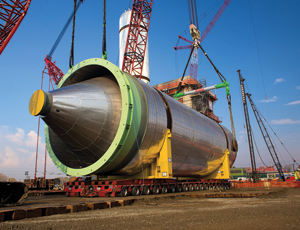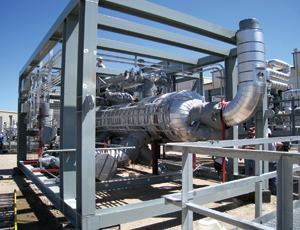After nearly four years of high-octane growth, the petroleum industry has abruptly reversed course as the collapse of the global financial crisis has driven down crude-oil prices and consumer demand, causing oil producers to hit the brakes on a bevy of pipeline, refinery, exploration and storage-facility projects.


CB&I is fabricating more than 120 modules for an Illinois refinery expansion that will double the refinery’s capacity to 240,000 bpd. The modules will be shipped and installed on-site.
“When the economy began to deteriorate, it forced most clients to put everything on hold, and we are still in a holding pattern,” says Lou Pucher, president of The Shaw Group’s energy and chemicals group in Houston. “Everyone is still trying to get a clear signal on what will happen with the price of oil and global consumption.
”A year ago, design and construction firms were racing to keep up with the industry’s torrid expansion as producers flushed with profits poured huge investments into the booming oil-sands region of Alberta, Canada, deepwater drilling in the Gulf of Mexico, as well as refinery expansions and pipeline projects. Soaring costs for services, labor and equipment pushed globally linked supply chains to the limit. Firms struggled to find enough manpower to meet demand and began outsourcing design and engineering work to foreign offices and employing engineers from South America and Southeast Asia. But the market downshifted dramatically when oil prices plunged from a high of$147 a barrel last July to $31 a barrel in December.
“The U.S. market is still pretty tough,” says John Redmon, president of CB&I Lummus at Chicago Bridge &Iron Co. in The Woodlands, Texas. “There has been a lot of churn in the market as major oil producers have reduced costs through reorganization, downsizing and rebidding projects.”
Suncor Energy Inc. revised its spending budget and delayed plans to build a new upgrader at the company’s Voyager oil-sands project north of Fort McMurray. The $20.6-billion expansion project would have increased crude-oil production at the facility by 200,000 barrels per day to 550,000 bpd.
Instead, the Canadian energy firm merged with oil-and-gas exploration and development company Petro-Canada, Calgary, Canada.
Leading U.S. refiner Valero Energy cut $800 million from its capital budget for 2009 by pushing back construction of a diesel hydrotreater and aromatics unit at its Norco refinery in Louisiana and the upgrade of a gasoline-making fluid catalytic cracking unit at its Memphis refinery. The company also indefinitely postponed a $1.7-billion hydrocracker project at it sport Arthur, Texas, refinery in order to acquire a 45% share of a refinery in the Netherlands that already had a hydrocracker unit. Meanwhile, global energy companies BP, Shell and Exxon Mobile have slashed costs and revamped their organizations to adjust to lower oil prices that have put major oil companies’ earnings under pressure.
Design and construction firm executives say the upside of the downturn is that the industry is now growing at a more sustainable rate. “The slowdown has actually helped bring the industry back into balance,” says Greg Landry, Jacobs executive vice-president of operations in Houston. “At the time, there was no more capacity in the market from a global perspective. Every resource from materials to human capital was overextended.”
So far, producers’ hesitation to commit to large investments has not left engineering and construction firms idling. Several projects continue to progress despite the worldwide recession, albeit at a slower pace.
“The market reached a peak last year, creating a substantial backlog that we are still working through,” says Peter Oosterveer, energy and chemicals president of Irving, Tex.-based Fluor. “Often clients are choosing to stretch out schedules instead of cancel projects.”
Fluor is nearing completion on Marathon Oil’s $3.35-billionexpansion of its Garyville, La., refinery. The project involves the addition of a new 180,000-bpd crude and vacuum distillation unit, 44,000-bpd delayed coker, 70,000-bpd heavy gas-oil hydrocracker,65,000-bpd reformer and 47,000-bpd kerosene…


Post a comment to this article
Report Abusive Comment